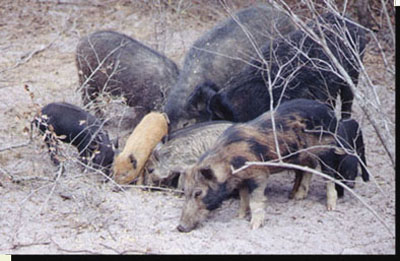

|
|
| This is a maternal group with a young litter. The piglets had the lengthwise stripes that are associated with boars, both wild and domestic, of Eurasian origins, but they have now outgrown them. |
| It would be shorter
to list what hogs do not eat than what they do eat. They are omnivores
(eating both plants and animals) and opportunists, and will eat virtually
every plant or animal available. They are not generally thought of
as predators, but they are. They are drawn to birthing areas by their
acute sense of smell, and will eat the newborn and placenta so there is
no trace left. Ranchers cannot tell whether they lost newborn stock
or never had it. They prey on reptiles (including rattlesnakes), amphibians, birds and their eggs, insects, worms, and any smaller mammal, dead or alive, that makes itself available. Carrion is eaten with relish, and hogs are known to eat manure. Favored vegetation is acorns, any fruits, seeds or nuts, mushrooms, roots, bark, and although they are not grazers, they will eat some grasses. They compete with whitetail deer (Who also are not grazers; they are browsers.) to the detriment of the whitetails. Predators of the grown hogs are humans, bears, packs of wolves or dogs and panthers. The shoats and pigs can be taken by dogs, coyote, bobcats, other medium sized carnivores like racoons, and the larger raptors such as owls and eagles. True to the hog's ruthless nature, shoats and pigs are commonly cannibalized by larger hogs. When we think of predators, we usually first think of carnivores like the cougar or coyote. Hogs though are opportunistic omnivores, and predation is just one of the many skills they use to get a meal.
|
|
HISTORY APPEARANCE BOARS & WATER BODY LANGUAGE FIGHTS BREEDING HOG SIGN |
HOG TRACKS DIET AND PREDATORS US DISTRIBUTION FL HUNTING REGS HOG TERMS BACK TO WILD BOARS ANIMALS |